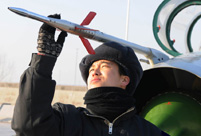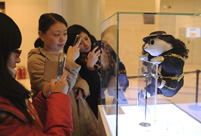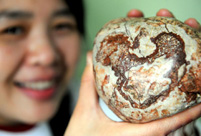 Int'l Snow Sculpture Art Expo in Harbin
Int'l Snow Sculpture Art Expo in Harbin Sichuan money wall for dividend payment
Sichuan money wall for dividend payment Li Na crashes Belinda Bencic in 2nd round at Australian Open
Li Na crashes Belinda Bencic in 2nd round at Australian Open
 Shocking moments when PLA's weapons open fire
Shocking moments when PLA's weapons open fire Famous Lanzhou beef noodles
Famous Lanzhou beef noodles Armed Police hold anti-terrorism drill in SE China's Xiamen
Armed Police hold anti-terrorism drill in SE China's Xiamen Harbin Int'l Ice and Snow Festival opens
Harbin Int'l Ice and Snow Festival opens 'Jin' named the word of the year by cross-strait netizens
'Jin' named the word of the year by cross-strait netizens Chinese scientific expedition goes to build new Antarctica station
Chinese scientific expedition goes to build new Antarctica station
"I think the future relationship between the U.S and China can be the most glorious historical event that we have ever seen, I hope and pray, and I believe it will come true."
On Dec. 15, 1978, Deng Xiaoping and I announced simultaneously in Beijing and Washington that we were going to normalize diplomatic relations the first day of 1979, and just three days later, on Dec. 18, Deng Xiaoping announced reform and opening up for the people in his own country at the 3rd Plenum of the 11th National Congress of the Chinese Communist Party.
Early on I went to China as a guest of Deng Xiaoping, and he explained to me in our private sessions what his goal for China was. We looked upon his reform and opening up policy.
The other major development is opening China up to the outside, and China has now become omnipresent or ubiquitous throughout the world. My wife and I have visited more than 140 nations in the world, and we see the Chinese presence everywhere, throughout Latin America, Africa, Asia, all over the world. I think this is what Deng Xiaoping meant by opening up, to expand the ancient culture of China and share its achievements with others.
China once was a very poor developing country with no free economic system at all and now is one of the most open, free, and dynamic economic systems on earth. Chinese people could go and say to poverty-stricken African countries "This is what's happened to us, just in recent years, and let us share this with you."
Related: China’s four tasks for building new-type relationship with major powers
We have differences of ancient history in China and recent history in America. We have different cultures; we have different environmental problems, challenges, and opportunities; we have different geographies; we have different alliances next door to us that are very precious to us; and we have a different political system.
One of the things I shared with Deng Xiaoping was the need to break down the cultural barriers that existed. As reported in the news, 235,000 Chinese students are studying in American colleges and universities. It makes me very proud, because this is what it takes to break down the cultural differences and make sure that we have a new generation of Chinese and American leaders coming along who will be able to accommodate differences and still cherish the things that bind us together for the common good of all mankind and womankind.
I was in South Africa the last weekend in October last year, with world leaders from all over the globe. They were bemoaning the fact that the greatest challenge the next generation on earth faces is probably global warming. And the tragedy is that nations have not been able to work harmoniously or in concert.
I think it would be a notable and noble bilateral commitment for our two presidents, our two foreign ministers, our scientific advisors, to get together in private talks and work out a proposal to deal with global warming and declare "We two nations agree, and now , other nations, please come on board with us."
I hope to see our nations adopt as common commitments: helping developing countries improve their lives, understanding one another and taking on two or three big-picture issues. I think the future relationship between our two countries can be the most glorious historical event that we have ever seen, I hope and pray, and I believe it will come true.
Arranged on People's Daily's interview with Jimmy Carter, the 39th president of the U.S. Wen Xian contributes to the story.
 Su-30 fighter formation taking off for training
Su-30 fighter formation taking off for training  Xuelong carries on mission after breaking from floes
Xuelong carries on mission after breaking from floes Charity exhibition raises money for panda protection
Charity exhibition raises money for panda protection 'Map of China' on the stone
'Map of China' on the stone  Chinese naval escort taskforce repels 4 suspicious vessels
Chinese naval escort taskforce repels 4 suspicious vessels World's weekly photos (1.6-1.12)
World's weekly photos (1.6-1.12) Li Na crashes Belinda Bencic in 2nd round at Australian Open
Li Na crashes Belinda Bencic in 2nd round at Australian Open Weekly sports photos
Weekly sports photos China's national pole dancing to play 'The Butterfly Love'
China's national pole dancing to play 'The Butterfly Love'  The never-ending Silk Road
The never-ending Silk Road  Spring Festival travel rush: One window, one world
Spring Festival travel rush: One window, one world Int'l Snow Sculpture Art Expo in Harbin
Int'l Snow Sculpture Art Expo in Harbin China photographs internal structure of water molecule
China photographs internal structure of water molecule 'Predator' makes proposal to girlfriend
'Predator' makes proposal to girlfriend Thousands of fish frozen on Norway sea
Thousands of fish frozen on Norway seaDay|Week|Month